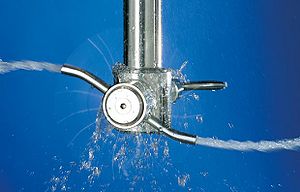Difference between revisions of "Category:Cleaning"
| (9 intermediate revisions by the same user not shown) | |||
| Line 1: | Line 1: | ||
[[Category:Processing]] | [[Category:Processing]] | ||
Industrial cleaning is the process of removing unwanted (residual) material or maintaining that state. This can be done by: | |||
Industrial cleaning is the process of | * Mechanically [[Image:Cleaning.jpg|thumb|300px|Spray system]] | ||
* Mechanically | |||
**Scrapers, to remove dirt | **Scrapers, to remove dirt | ||
**Brushes | **Brushes | ||
| Line 10: | Line 9: | ||
**Airblasters | **Airblasters | ||
* Chemically, by using detergents | * Chemically, by using detergents | ||
*Liquids | *Liquids | ||
**Rinsing and flushing | **Rinsing and flushing | ||
**Spraying | **Spraying | ||
| Line 17: | Line 16: | ||
**Balls | **Balls | ||
*Vibrations | *Vibrations | ||
* Acoustic, using sound waves | **Acoustic, using sound waves | ||
** | **Shakers | ||
* Thermal, like steam or burners | * Thermal, like steam or burners | ||
*Passive | *Passive | ||
| Line 24: | Line 23: | ||
**Anti bacterial materials | **Anti bacterial materials | ||
Clean-in-Place (CIP) is a method of cleaning the interior surfaces of process equipment without disassembling the system. Up to the 1950's, closed systems were disassembled and cleaned manually. Industries that rely heavily on CIP are those requiring high levels of hygiene, and include: dairy, beverage, brewing, processed foods, pharmaceutical, and cosmetics. The benefit to industries that use CIP is that the cleaning is faster, less labor intensive and more repeatable, and poses less of a chemical exposure risk to people. CIP started as a manual practice involving a balance tank, centrifugal pump, and connection to the system being cleaned. Since the 1950's, CIP has evolved to include fully automated systems with programmable PLC's, multiple balance tanks, sensors, valves, heat exchangers, data acquisition and specially designed spray nozzle systems. | |||
Clean-in-Place (CIP) is a method of cleaning the interior surfaces of | |||
The benefit to industries that use CIP is that the cleaning is faster, less labor intensive and more repeatable, and poses less of a chemical exposure risk to people. CIP started as a manual practice involving a balance tank, centrifugal pump, and connection to the system being cleaned. Since the 1950's, CIP has evolved to include fully automated systems with programmable PLC's, multiple balance tanks, sensors, valves, heat exchangers, data acquisition and specially designed spray nozzle systems | |||
Depending on soil load and process geometry, the CIP design principle is one of the following: | Depending on soil load and process geometry, the CIP design principle is one of the following: | ||
*Deliver highly turbulent, high flow-rate solution to effect good cleaning | *Deliver highly turbulent, high flow-rate solution to effect good cleaning. | ||
*Deliver solution as a low-energy spray to fully wet the surface | *Deliver solution as a low-energy spray to fully wet the surface. | ||
*Deliver a high energy impinging spray | *Deliver a high energy impinging spray | ||
[[lw:Category:Cleaning]] | |||
Latest revision as of 07:48, 11 March 2014
Industrial cleaning is the process of removing unwanted (residual) material or maintaining that state. This can be done by:
- Mechanically
- Scrapers, to remove dirt
- Brushes
- Filters
- Gases
- Vacuum cleaners
- Airblasters
- Chemically, by using detergents
- Liquids
- Rinsing and flushing
- Spraying
- Solids
- Ice
- Balls
- Vibrations
- Acoustic, using sound waves
- Shakers
- Thermal, like steam or burners
- Passive
- Non-stick linings
- Anti bacterial materials
Clean-in-Place (CIP) is a method of cleaning the interior surfaces of process equipment without disassembling the system. Up to the 1950's, closed systems were disassembled and cleaned manually. Industries that rely heavily on CIP are those requiring high levels of hygiene, and include: dairy, beverage, brewing, processed foods, pharmaceutical, and cosmetics. The benefit to industries that use CIP is that the cleaning is faster, less labor intensive and more repeatable, and poses less of a chemical exposure risk to people. CIP started as a manual practice involving a balance tank, centrifugal pump, and connection to the system being cleaned. Since the 1950's, CIP has evolved to include fully automated systems with programmable PLC's, multiple balance tanks, sensors, valves, heat exchangers, data acquisition and specially designed spray nozzle systems.
Depending on soil load and process geometry, the CIP design principle is one of the following:
- Deliver highly turbulent, high flow-rate solution to effect good cleaning.
- Deliver solution as a low-energy spray to fully wet the surface.
- Deliver a high energy impinging spray
Pages in category "Cleaning"
The following 42 pages are in this category, out of 42 total.
